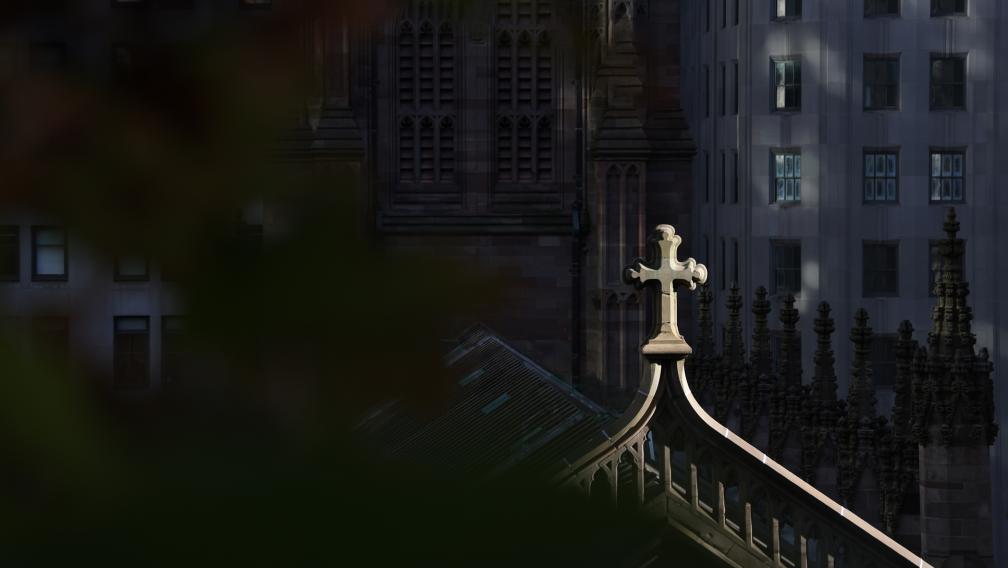It is an enduring paradox of Christianity that in the most difficult moments in our lives — when we have lost hope and long for God to bring us answers, to end our suffering, to fix things — we are instead instructed to wait. We are told that despite evidence to the contrary (the wars, conflicts, and uncertainties in our world), everlasting life and communion with God is coming. We are told there will be a time when all is resolved by God’s promises, when both God’s justice and mercy reign. But in the interim, we are asked to do God’s work in the here and now, while remaining in prayerful hope for the world to come.
In Matthew 25:1–13, Jesus tells a parable describing the kingdom of heaven as ten bridesmaids going to meet the bridegroom. They carried their lamps with them, but only some of the bridesmaids took flasks of oil to keep their light burning. When the bridegroom was delayed, those who hadn’t brought extra oil had to leave the waiting room to buy more, and thus missed the moment when the bridegroom came to take the bridesmaids to the banquet. The bridegroom leaves without them. “Keep awake,” Jesus exhorted his followers, “for you know not the day or the hour.”
Jesus’s parable sounds cryptic to modern ears. Who is this mysterious bridegroom, and why are there ten bridesmaids waiting for him? If Jesus is speaking here of the coming Kingdom of God — when he will return to set all things right — why is the verdict so harsh? Must the five “foolish” bridesmaids be kept out of God’s kingdom for forgetting some oil?
Context, as usual, is key. Jesus’s story follows a series of vignettes about the power of watchfulness, in which he reminds us we are not to be overwhelmed by bad news but to stay in communion with God, to keep the lamplight of our faith burning in trust and in hope. It is not that Jesus expects us to be perfect or naive, ever vigilant in each waking second, nor burying our heads in the sand. Rather, we are tasked with a generative stillness — a way of being that keeps us busy with God’s work in the here and now while remaining in prayerful hope for the world to come.
We are tasked with a generative stillness — a way of being that keeps us busy with God’s work in the here and now while remaining in prayerful hope for the world to come.
As theologian W. Fiona Chen writes, “Optimism and hope are two different things. While the former implies passive longing, the latter requires active participation. I have begun to realize that hope is not merely a warm and fuzzy feeling I hang on to when I myself am in deep desolation. It is a Christian obligation, just as love is.”
The holy obligation to hope is to live in the tension of God’s here-and-not-yet kingdom. In this time of waiting, we are called to be active participants in God’s healing work in the world today — to be God’s hands and feet to those in need. Called to be peacemakers in times of conflict. Called to be the light of the world.
Here are more ways to think deeply about what this call to hope means for you today.
Professors of theology D. Brent Laytham and Michelle Clifton-Soderstrom show us how the Gospel flips the American impulse for selfish individualism on its head — “[T]he kingdom’s economy has never been one of scarcity (“If I share with you, I won’t have enough”). Instead, the kingdom of heaven is about an abundance, given to all” — and encourage us to stay awake.
Legendary folk singer and civil rights activist Odetta performs “This Little Light of Mine.”
In “Autobiographical Fragment,” poet Katie Peterson sees the light under the bushel from another perspective.
Theologian W. Fiona Chen considers good and evil, freedom, and the Christian obligation to hope: “Such a humbling thought is crystalized when we come to the realization that no one is in the position to deny anyone the infinite love and mercy of God.
